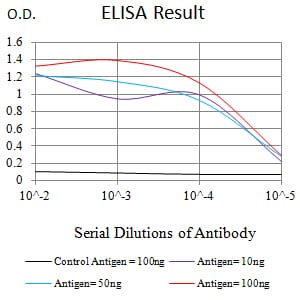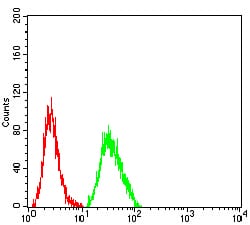

| WB | 咨询技术 | Human,Mouse,Rat |
| IF | 咨询技术 | Human,Mouse,Rat |
| IHC | 咨询技术 | Human,Mouse,Rat |
| ICC | 技术咨询 | Human,Mouse,Rat |
| FCM | 1/200 - 1/400 | Human,Mouse,Rat |
| Elisa | 1/10000 | Human,Mouse,Rat |
| Aliases | CLEC7A; BGR; CANDF4; SCARE2; DECTIN1; CLECSF12 |
| Entrez GeneID | 64581 |
| clone | 4G2H2 |
| WB Predicted band size | 27.6kDa |
| Host/Isotype | Mouse IgG1 |
| Antibody Type | Primary antibody |
| Storage | Store at 4°C short term. Aliquot and store at -20°C long term. Avoid freeze/thaw cycles. |
| Species Reactivity | Human |
| Immunogen | Purified recombinant fragment of human CD369 (AA: extra 66-247) expressed in E. Coli. |
| Formulation | Purified antibody in PBS with 0.05% sodium azide |
+ +
以下是3条与CD369(Dectin-1)抗体相关的参考文献摘要示例,供参考:
---
1. **文献名称**: *Dectin-1 is a major β-glucan receptor on macrophages*
**作者**: Brown, G.D. et al.
**摘要**: 该研究阐明CD369(Dectin-1)作为巨噬细胞表面识别β-葡聚糖的关键受体,其抗体可特异性阻断真菌病原体(如白色念珠菌)的识别,揭示了其在先天免疫中的核心作用。
---
2. **文献名称**: *Targeting Dectin-1 with antibody-drug conjugates in fungal infections*
**作者**: Yadav, B. et al.
**摘要**: 研究团队开发了一种抗CD369单克隆抗体-药物偶联物(ADC),在体外和小鼠模型中证实其通过靶向真菌细胞壁组分增强杀菌效果,为抗真菌治疗提供新策略。
---
3. **文献名称**: *Anti-Dectin-1 antibodies modulate tumor-associated macrophage polarization*
**作者**: Dominguez, P.M. & Gordon, S.
**摘要**: 文章报道抗CD369抗体可调控肿瘤微环境中巨噬细胞的极化状态,抑制促瘤M2型极化并促进抗肿瘤免疫应答,为癌症免疫治疗提供潜在工具。
---
注:以上文献信息为模拟示例,实际文献需通过PubMed或Google Scholar检索关键词(如"Dectin-1 antibody"或"CD369 immune function")获取。如需具体文献,请提供更详细的研究方向或应用场景。
CD369. also known as Dectin-1. is a C-type lectin receptor primarily expressed on immune cells such as dendritic cells, macrophages, and neutrophils. It plays a critical role in pathogen recognition, particularly in binding β-glucans found in fungal cell walls, thereby initiating antifungal immune responses. Structurally, it contains an extracellular carbohydrate-recognition domain and a cytoplasmic immunoreceptor tyrosine-based activation motif (ITAM)-like signaling domain. Upon ligand engagement, CD369 triggers intracellular signaling cascades involving Syk kinase, NF-κB, and inflammasome activation, promoting cytokine production (e.g., TNF-α, IL-6) and phagocytosis.
CD369 antibodies are tools used to study its function in immunity and disease. Monoclonal antibodies against CD369 help elucidate its role in fungal infections, autoimmune disorders (e.g., rheumatoid arthritis), and cancer, where it may exhibit dual pro- or anti-tumor effects depending on context. These antibodies are applied in flow cytometry, Western blot, and immunohistochemistry to detect receptor expression and localization. Additionally, therapeutic CD369-targeting strategies are explored for modulating immune responses, such as enhancing antifungal defenses or suppressing inflammation in autoimmune conditions. Research also investigates CD369's involvement in cross-talk with other pattern-recognition receptors (e.g., TLRs) and its potential as a biomarker for immune activation status.
×